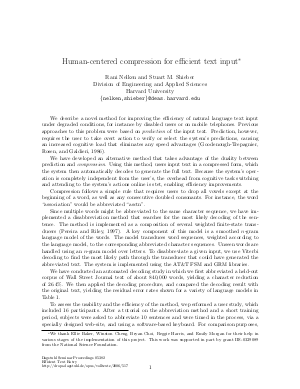Human-centered compression for efficient text input
Authors Rani Nelken, Stuart M. Shieber
-
Part of:
Volume:
Dagstuhl Seminar Proceedings, Volume 5382
Part of: Series: Dagstuhl Seminar Proceedings (DagSemProc) - License:
 Creative Commons Attribution 4.0 International license
Creative Commons Attribution 4.0 International license
- Publication Date: 2006-04-19
File

PDF
DagSemProc.05382.4.pdf
- Filesize: 98 kB
- 2 pages
Document Identifiers
Subject Classification
Keywords
- Prediction
- compression
- weigthed finite state transducers
- text input
Metrics
- Access Statistics
-
Total Accesses (updated on a weekly basis)
0Document
0Metadata
Abstract
Traditional methods for efficient text entry are based on prediction. Prediction requires a constant context-shift between entering text and selecting or verifying the predictions. Previous research has shown that the advantages offered by prediction are usually eliminated by the cognitive load associated with such context-switching. We present a novel approach that relies on compression. Users are required to compress text using a very simple abbreviation technique that yields an average keystrok reduction of 26.4%. Input text is automatically decoded using weighted finite-state transducers, incorporating both word-based and letter-based n-gram language models. Decoding yields a residual error rate of 3.3%. User experiments show that this approach yields improved text input speeds.
Cite As Get BibTex
Rani Nelken and Stuart M. Shieber. Human-centered compression for efficient text input. In Efficient Text Entry. Dagstuhl Seminar Proceedings, Volume 5382, pp. 1-2, Schloss Dagstuhl – Leibniz-Zentrum für Informatik (2006)
https://doi.org/10.4230/DagSemProc.05382.4
BibTex
@InProceedings{nelken_et_al:DagSemProc.05382.4,
author = {Nelken, Rani and Shieber, Stuart M.},
title = {{Human-centered compression for efficient text input}},
booktitle = {Efficient Text Entry},
pages = {1--2},
series = {Dagstuhl Seminar Proceedings (DagSemProc)},
ISSN = {1862-4405},
year = {2006},
volume = {5382},
editor = {Karin Harbusch and Kari-Jouko Raiha and Kumiko Tanaka-Ishii},
publisher = {Schloss Dagstuhl -- Leibniz-Zentrum f{\"u}r Informatik},
address = {Dagstuhl, Germany},
URL = {https://drops.dagstuhl.de/entities/document/10.4230/DagSemProc.05382.4},
URN = {urn:nbn:de:0030-drops-5176},
doi = {10.4230/DagSemProc.05382.4},
annote = {Keywords: Prediction, compression, weigthed finite state transducers, text input}
}
